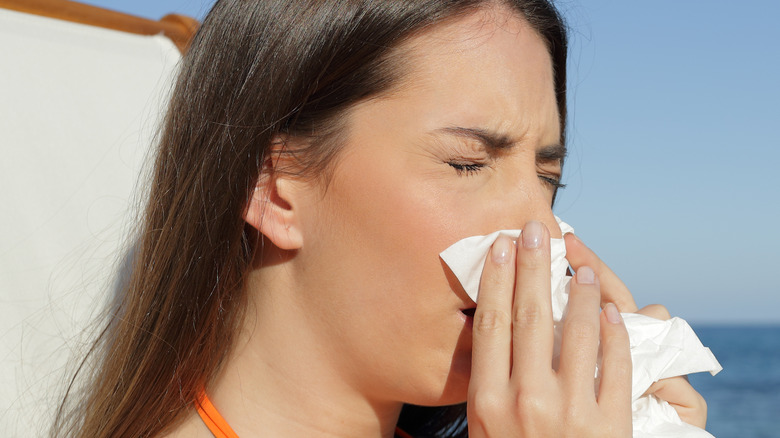How To Plan For A Beach Vacation If You Suffer From Seasonal Allergies
A trip to the beach is something we all wait for after the winter months keep us indoors. There's nothing worse, however, than waiting all year for the weather to become warm and inviting for you to go to the beach, and you end up suffering from seasonal allergies. Talk about the allergies being a wet blanket on your summer beach plans.
There are a considerable number of people who suffer from allergic reactions from things that are commonly found in a beach environment — including sunscreen, stings, sun, and even the water itself (via Very Well Health). There are common beach allergy symptoms you can watch out for before you plan your next beach trip. Per Allergy Preventions some symptoms to watch for are watery eyes, sneezing, itchy throat, congestion, and hives.
While the extra effort and thought that might be required before you pack your bags for your beach vacation can put a damper on things, it is always better to be safe than sorry.
Sun allergies and how to work around them
If an allergic reaction to the sun is your concern, you might be suffering from a sun allergy which is an "irrational immune system response to sunlight," according to Allergy Preventions. Sun allergies can manifest in a variety of skin issues from itching to burning, reports Very Well Health. While avoiding the sun is the most ideal response to this allergy, we know that it's not the most realistic advice. Applying sunscreen can be your next best choice, Allergy Preventions suggests.
But, what if you're allergic to your sunscreen? According to the Australian Cancer Council, irritant contact dermatitis and allergic contact dermatitis are the two most common types of contact dermatitis people with sunscreen allergies should watch out for. Understanding what ingredients in sunscreen are causing your allergic reaction can be both tricky and time-consuming. You may need to plan a few months ahead in order to find out which sunscreen works best on your skin. You can also seek out the advice of a dermatologist to see what sunscreens they'd recommend. Testing a small amount of the product by applying it to your inner forearm to identify how your skin reacts to it is also a good idea (via the Australian Cancer Council).
The benefits of wearing sunscreen outweigh any reason not to slather some on, so it might be advisable to spend some time testing a few products on yourself before your next beach vacation.
What about ocean water allergies?
Determining what to do if you happen to be prone to water allergies when planning a beach vacation can seem daunting. After all, the beach has an abundance of it. From swimmer's itch and Seabather's Eruption to Toxic Seaweed Dermatitis, the conditions are numerous when it comes to ocean water allergies (via Allergy Preventions). Living organisms in the ocean water are usually the culprits for causing such allergies, but there are some simple things you can keep in mind to mitigate their effects.
Allergy Preventions recommend avoiding the ocean as the most effective preventative measure. If you're not someone who loves swimming or the water and would prefer to just stay on the shore with a good book or two, then perhaps avoidance isn't an issue for you.
If you can't keep out of the water when you're on your beach vacation, then fear not. Other recommendations include showering and changing out of your wet clothes after you get out of the water, swimming in deeper and cooler water, and applying waterproof sunscreen (per Allergy Preventions).
How to work around sand and insect allergies
With sand allergies, the triggers to blame are often contact dermatitis in the sand itself. According to Allergy Preventions, these are often found in mold, seaweed, insect parts, and even pollution. As with ocean water allergies, the most popular advice when it comes to sand allergies is to avoid the sand altogether. But, you do have other options such as showering right after you leave the beach, limiting your time in the sand, and going to beaches with as little pollution as possible (via Allergy Preventions).
Sand flies, sand fleas, mosquitoes, bloodworms, and bees are some of the most common insects to look out for at the beach. Very Well Health notes that symptoms of allergies brought on by these insect bites can vary from intense hives and swelling to severe nausea and stomach issues. Allergy Preventions recommends simple things like using bug spray, limiting outdoor beach activities when insects are most prevalent (dawn and dusk), avoiding visiting the beach on gloomier days, and wearing long clothing.
You might also want to watch out for regular seasonal allergy triggers while you're at the beach like pet dander, grass, dust mites, trees, and seafood. There is no reason to avoid that beach vacation altogether. All you need is a little preparation.



